Create linguistic diagram (in TikZ?)TikZ: What EXACTLY does the the |- notation for arrows do?How to align...
Is it legal to point a domain to someone else's ip (website)?
Why do single electrical receptacles exist?
Was there a pre-determined arrangement for the division of Germany in case it surrendered before any Soviet forces entered its territory?
"I showed the monkey himself in the mirror". Why is this sentence grammatical?
How can I prevent an oracle who can see into the past from knowing everything that has happened?
Is it possible to detect 100% of SQLi with a simple regex?
Why are mages sometimes played bot instead of traditional ADCs?
Why do objects rebound after hitting the ground?
Crack the bank account's password!
How do I add a strong "onion flavor" to the biryani (in restaurant style)?
What is the draw frequency for 3 consecutive games (same players; amateur level)?
my cron command doesn’t work
How can I deduce the power of a capacitor from its datasheet?
Modern Algebraic Geometry and Analytic Number Theory
How many proficiencies and languages does a noble half-elf Knowledge Domain cleric start with?
Insecure private-key encryption
Why is it that Bernie Sanders is always called a "socialist"?
When using Volatility with a memory image, what is the Kernel version?
Identical projects by students at two different colleges: still plagiarism?
How long has this character been impersonating a Starfleet Officer?
Buying a "Used" Router
Should a new user just default to LinearModelFit (vs Fit)
Can me and my friend spend the summer in Canada (6 weeks) at 16 years old without an adult?
How do you get out of your own psychology to write characters?
Create linguistic diagram (in TikZ?)
TikZ: What EXACTLY does the the |- notation for arrows do?How to align the top of the text with the top of a figure produced by tikz in minipageLaTeX equivalent of ConTeXt buffersRotate a node but not its content: the case of the ellipse decorationIntersection of paths with constructed namesHow to define the default vertical distance between nodes?To wrap the external lines so that it can touch the perimeterTikZ scaling graphic and adjust node position and keep font sizeHelp understanding the coordinate system used in tikzTikZ/ERD: node (=Entity) label on the insideTikZ: Drawing an arc from an intersection to an intersectionLine up nested tikz enviroments or how to get rid of them
I want to create a dependency diagram such as the following:

So far, I have done this using TikZ:
documentclass{article}
usepackage{tikz}
usepackage{calc}
begin{document}
defmytext{The man}
newlength{basewidth}
setlength{basewidth}{widthof{mytext}}
begin{tikzpicture}[
firstnode/.style={
shape = rectangle,
inner sep = 2pt,
anchor=south west,
}
]
draw[thin] (0,0) -- (basewidth + 2ex,0);
draw[thin] (0,0) -- (0, 1.5em);
draw (0,0) node[firstnode,
minimum width = basewidth] {mytext};
end{tikzpicture}
end{document}
Which gives me the following output:

How may I complete the diagram (in repeatable, efficient way)?
tikz-pgf diagrams linguistics
New contributor
p.lugan is a new contributor to this site. Take care in asking for clarification, commenting, and answering.
Check out our Code of Conduct.
add a comment |
I want to create a dependency diagram such as the following:

So far, I have done this using TikZ:
documentclass{article}
usepackage{tikz}
usepackage{calc}
begin{document}
defmytext{The man}
newlength{basewidth}
setlength{basewidth}{widthof{mytext}}
begin{tikzpicture}[
firstnode/.style={
shape = rectangle,
inner sep = 2pt,
anchor=south west,
}
]
draw[thin] (0,0) -- (basewidth + 2ex,0);
draw[thin] (0,0) -- (0, 1.5em);
draw (0,0) node[firstnode,
minimum width = basewidth] {mytext};
end{tikzpicture}
end{document}
Which gives me the following output:

How may I complete the diagram (in repeatable, efficient way)?
tikz-pgf diagrams linguistics
New contributor
p.lugan is a new contributor to this site. Take care in asking for clarification, commenting, and answering.
Check out our Code of Conduct.
Welcome! Did you have a look at theforestpackage?
– marmot
2 hours ago
Thanks! Yes, but those aren't the kind of diagrams I want. I need this other kind to help my students easily grasp the sentence syntax.
– p.lugan
2 hours ago
add a comment |
I want to create a dependency diagram such as the following:

So far, I have done this using TikZ:
documentclass{article}
usepackage{tikz}
usepackage{calc}
begin{document}
defmytext{The man}
newlength{basewidth}
setlength{basewidth}{widthof{mytext}}
begin{tikzpicture}[
firstnode/.style={
shape = rectangle,
inner sep = 2pt,
anchor=south west,
}
]
draw[thin] (0,0) -- (basewidth + 2ex,0);
draw[thin] (0,0) -- (0, 1.5em);
draw (0,0) node[firstnode,
minimum width = basewidth] {mytext};
end{tikzpicture}
end{document}
Which gives me the following output:

How may I complete the diagram (in repeatable, efficient way)?
tikz-pgf diagrams linguistics
New contributor
p.lugan is a new contributor to this site. Take care in asking for clarification, commenting, and answering.
Check out our Code of Conduct.
I want to create a dependency diagram such as the following:

So far, I have done this using TikZ:
documentclass{article}
usepackage{tikz}
usepackage{calc}
begin{document}
defmytext{The man}
newlength{basewidth}
setlength{basewidth}{widthof{mytext}}
begin{tikzpicture}[
firstnode/.style={
shape = rectangle,
inner sep = 2pt,
anchor=south west,
}
]
draw[thin] (0,0) -- (basewidth + 2ex,0);
draw[thin] (0,0) -- (0, 1.5em);
draw (0,0) node[firstnode,
minimum width = basewidth] {mytext};
end{tikzpicture}
end{document}
Which gives me the following output:

How may I complete the diagram (in repeatable, efficient way)?
tikz-pgf diagrams linguistics
tikz-pgf diagrams linguistics
New contributor
p.lugan is a new contributor to this site. Take care in asking for clarification, commenting, and answering.
Check out our Code of Conduct.
New contributor
p.lugan is a new contributor to this site. Take care in asking for clarification, commenting, and answering.
Check out our Code of Conduct.
New contributor
p.lugan is a new contributor to this site. Take care in asking for clarification, commenting, and answering.
Check out our Code of Conduct.
asked 2 hours ago
p.luganp.lugan
82
82
New contributor
p.lugan is a new contributor to this site. Take care in asking for clarification, commenting, and answering.
Check out our Code of Conduct.
New contributor
p.lugan is a new contributor to this site. Take care in asking for clarification, commenting, and answering.
Check out our Code of Conduct.
p.lugan is a new contributor to this site. Take care in asking for clarification, commenting, and answering.
Check out our Code of Conduct.
Welcome! Did you have a look at theforestpackage?
– marmot
2 hours ago
Thanks! Yes, but those aren't the kind of diagrams I want. I need this other kind to help my students easily grasp the sentence syntax.
– p.lugan
2 hours ago
add a comment |
Welcome! Did you have a look at theforestpackage?
– marmot
2 hours ago
Thanks! Yes, but those aren't the kind of diagrams I want. I need this other kind to help my students easily grasp the sentence syntax.
– p.lugan
2 hours ago
Welcome! Did you have a look at the
forest package?– marmot
2 hours ago
Welcome! Did you have a look at the
forest package?– marmot
2 hours ago
Thanks! Yes, but those aren't the kind of diagrams I want. I need this other kind to help my students easily grasp the sentence syntax.
– p.lugan
2 hours ago
Thanks! Yes, but those aren't the kind of diagrams I want. I need this other kind to help my students easily grasp the sentence syntax.
– p.lugan
2 hours ago
add a comment |
1 Answer
1
active
oldest
votes
How about this?
documentclass{article}
usepackage[edges]{forest}
forestset{students/.style={folder,
grow'=0,edge = {semithick},
edge path'={(!u.south-|.south west) |- (.south east)},
anchor=west,l sep=2.5em,s sep=0em}}
usepackage{adjustbox}
begin{document}
begin{tabular}{lll}
begin{adjustbox}{valign=T}
begin{forest}
for tree={students}
[The man
[big]
[who lept
[nimbly]
[over the wall]
]
]
end{forest}end{adjustbox}&
begin{adjustbox}{valign=T}begin{forest}
for tree={students}
[sends
[always]
[to mother
[his]
]
[because he loves her
[truly,xshift=3em]]
]
end{forest}end{adjustbox}&
begin{adjustbox}{valign=T}begin{forest}
for tree={students}
[flowers
[expansive]
]
end{forest}
end{adjustbox}
end{tabular}
end{document}

In this update, I added the second tree for illustration and packed all the definitions in a style that you can recycle, and which allows you to make changes globally. The relative vertical alignment is adapted from this nice answer.
That's great! But is there a way of reducing the vertical space of the nodes?
– p.lugan
2 hours ago
@p.lugan Of course/ Just adds sep=0emafterl sep=2.5em.
– marmot
2 hours ago
Perfect. Just a side question: how can I manage to learn to do that by myself? The PGF/TikZ manual is simple overwhelming!
– p.lugan
2 hours ago
@p.lugan For this you may want to look at theforestmanual first. (I will add an update. The most important thing there, apart fromforest, will be this post.)
– marmot
2 hours ago
add a comment |
Your Answer
StackExchange.ready(function() {
var channelOptions = {
tags: "".split(" "),
id: "85"
};
initTagRenderer("".split(" "), "".split(" "), channelOptions);
StackExchange.using("externalEditor", function() {
// Have to fire editor after snippets, if snippets enabled
if (StackExchange.settings.snippets.snippetsEnabled) {
StackExchange.using("snippets", function() {
createEditor();
});
}
else {
createEditor();
}
});
function createEditor() {
StackExchange.prepareEditor({
heartbeatType: 'answer',
autoActivateHeartbeat: false,
convertImagesToLinks: false,
noModals: true,
showLowRepImageUploadWarning: true,
reputationToPostImages: null,
bindNavPrevention: true,
postfix: "",
imageUploader: {
brandingHtml: "Powered by u003ca class="icon-imgur-white" href="https://imgur.com/"u003eu003c/au003e",
contentPolicyHtml: "User contributions licensed under u003ca href="https://creativecommons.org/licenses/by-sa/3.0/"u003ecc by-sa 3.0 with attribution requiredu003c/au003e u003ca href="https://stackoverflow.com/legal/content-policy"u003e(content policy)u003c/au003e",
allowUrls: true
},
onDemand: true,
discardSelector: ".discard-answer"
,immediatelyShowMarkdownHelp:true
});
}
});
p.lugan is a new contributor. Be nice, and check out our Code of Conduct.
Sign up or log in
StackExchange.ready(function () {
StackExchange.helpers.onClickDraftSave('#login-link');
});
Sign up using Google
Sign up using Facebook
Sign up using Email and Password
Post as a guest
Required, but never shown
StackExchange.ready(
function () {
StackExchange.openid.initPostLogin('.new-post-login', 'https%3a%2f%2ftex.stackexchange.com%2fquestions%2f476529%2fcreate-linguistic-diagram-in-tikz%23new-answer', 'question_page');
}
);
Post as a guest
Required, but never shown
1 Answer
1
active
oldest
votes
1 Answer
1
active
oldest
votes
active
oldest
votes
active
oldest
votes
How about this?
documentclass{article}
usepackage[edges]{forest}
forestset{students/.style={folder,
grow'=0,edge = {semithick},
edge path'={(!u.south-|.south west) |- (.south east)},
anchor=west,l sep=2.5em,s sep=0em}}
usepackage{adjustbox}
begin{document}
begin{tabular}{lll}
begin{adjustbox}{valign=T}
begin{forest}
for tree={students}
[The man
[big]
[who lept
[nimbly]
[over the wall]
]
]
end{forest}end{adjustbox}&
begin{adjustbox}{valign=T}begin{forest}
for tree={students}
[sends
[always]
[to mother
[his]
]
[because he loves her
[truly,xshift=3em]]
]
end{forest}end{adjustbox}&
begin{adjustbox}{valign=T}begin{forest}
for tree={students}
[flowers
[expansive]
]
end{forest}
end{adjustbox}
end{tabular}
end{document}

In this update, I added the second tree for illustration and packed all the definitions in a style that you can recycle, and which allows you to make changes globally. The relative vertical alignment is adapted from this nice answer.
That's great! But is there a way of reducing the vertical space of the nodes?
– p.lugan
2 hours ago
@p.lugan Of course/ Just adds sep=0emafterl sep=2.5em.
– marmot
2 hours ago
Perfect. Just a side question: how can I manage to learn to do that by myself? The PGF/TikZ manual is simple overwhelming!
– p.lugan
2 hours ago
@p.lugan For this you may want to look at theforestmanual first. (I will add an update. The most important thing there, apart fromforest, will be this post.)
– marmot
2 hours ago
add a comment |
How about this?
documentclass{article}
usepackage[edges]{forest}
forestset{students/.style={folder,
grow'=0,edge = {semithick},
edge path'={(!u.south-|.south west) |- (.south east)},
anchor=west,l sep=2.5em,s sep=0em}}
usepackage{adjustbox}
begin{document}
begin{tabular}{lll}
begin{adjustbox}{valign=T}
begin{forest}
for tree={students}
[The man
[big]
[who lept
[nimbly]
[over the wall]
]
]
end{forest}end{adjustbox}&
begin{adjustbox}{valign=T}begin{forest}
for tree={students}
[sends
[always]
[to mother
[his]
]
[because he loves her
[truly,xshift=3em]]
]
end{forest}end{adjustbox}&
begin{adjustbox}{valign=T}begin{forest}
for tree={students}
[flowers
[expansive]
]
end{forest}
end{adjustbox}
end{tabular}
end{document}

In this update, I added the second tree for illustration and packed all the definitions in a style that you can recycle, and which allows you to make changes globally. The relative vertical alignment is adapted from this nice answer.
That's great! But is there a way of reducing the vertical space of the nodes?
– p.lugan
2 hours ago
@p.lugan Of course/ Just adds sep=0emafterl sep=2.5em.
– marmot
2 hours ago
Perfect. Just a side question: how can I manage to learn to do that by myself? The PGF/TikZ manual is simple overwhelming!
– p.lugan
2 hours ago
@p.lugan For this you may want to look at theforestmanual first. (I will add an update. The most important thing there, apart fromforest, will be this post.)
– marmot
2 hours ago
add a comment |
How about this?
documentclass{article}
usepackage[edges]{forest}
forestset{students/.style={folder,
grow'=0,edge = {semithick},
edge path'={(!u.south-|.south west) |- (.south east)},
anchor=west,l sep=2.5em,s sep=0em}}
usepackage{adjustbox}
begin{document}
begin{tabular}{lll}
begin{adjustbox}{valign=T}
begin{forest}
for tree={students}
[The man
[big]
[who lept
[nimbly]
[over the wall]
]
]
end{forest}end{adjustbox}&
begin{adjustbox}{valign=T}begin{forest}
for tree={students}
[sends
[always]
[to mother
[his]
]
[because he loves her
[truly,xshift=3em]]
]
end{forest}end{adjustbox}&
begin{adjustbox}{valign=T}begin{forest}
for tree={students}
[flowers
[expansive]
]
end{forest}
end{adjustbox}
end{tabular}
end{document}

In this update, I added the second tree for illustration and packed all the definitions in a style that you can recycle, and which allows you to make changes globally. The relative vertical alignment is adapted from this nice answer.
How about this?
documentclass{article}
usepackage[edges]{forest}
forestset{students/.style={folder,
grow'=0,edge = {semithick},
edge path'={(!u.south-|.south west) |- (.south east)},
anchor=west,l sep=2.5em,s sep=0em}}
usepackage{adjustbox}
begin{document}
begin{tabular}{lll}
begin{adjustbox}{valign=T}
begin{forest}
for tree={students}
[The man
[big]
[who lept
[nimbly]
[over the wall]
]
]
end{forest}end{adjustbox}&
begin{adjustbox}{valign=T}begin{forest}
for tree={students}
[sends
[always]
[to mother
[his]
]
[because he loves her
[truly,xshift=3em]]
]
end{forest}end{adjustbox}&
begin{adjustbox}{valign=T}begin{forest}
for tree={students}
[flowers
[expansive]
]
end{forest}
end{adjustbox}
end{tabular}
end{document}

In this update, I added the second tree for illustration and packed all the definitions in a style that you can recycle, and which allows you to make changes globally. The relative vertical alignment is adapted from this nice answer.
edited 11 mins ago
answered 2 hours ago
marmotmarmot
103k4122233
103k4122233
That's great! But is there a way of reducing the vertical space of the nodes?
– p.lugan
2 hours ago
@p.lugan Of course/ Just adds sep=0emafterl sep=2.5em.
– marmot
2 hours ago
Perfect. Just a side question: how can I manage to learn to do that by myself? The PGF/TikZ manual is simple overwhelming!
– p.lugan
2 hours ago
@p.lugan For this you may want to look at theforestmanual first. (I will add an update. The most important thing there, apart fromforest, will be this post.)
– marmot
2 hours ago
add a comment |
That's great! But is there a way of reducing the vertical space of the nodes?
– p.lugan
2 hours ago
@p.lugan Of course/ Just adds sep=0emafterl sep=2.5em.
– marmot
2 hours ago
Perfect. Just a side question: how can I manage to learn to do that by myself? The PGF/TikZ manual is simple overwhelming!
– p.lugan
2 hours ago
@p.lugan For this you may want to look at theforestmanual first. (I will add an update. The most important thing there, apart fromforest, will be this post.)
– marmot
2 hours ago
That's great! But is there a way of reducing the vertical space of the nodes?
– p.lugan
2 hours ago
That's great! But is there a way of reducing the vertical space of the nodes?
– p.lugan
2 hours ago
@p.lugan Of course/ Just add
s sep=0em after l sep=2.5em.– marmot
2 hours ago
@p.lugan Of course/ Just add
s sep=0em after l sep=2.5em.– marmot
2 hours ago
Perfect. Just a side question: how can I manage to learn to do that by myself? The PGF/TikZ manual is simple overwhelming!
– p.lugan
2 hours ago
Perfect. Just a side question: how can I manage to learn to do that by myself? The PGF/TikZ manual is simple overwhelming!
– p.lugan
2 hours ago
@p.lugan For this you may want to look at the
forest manual first. (I will add an update. The most important thing there, apart from forest, will be this post.)– marmot
2 hours ago
@p.lugan For this you may want to look at the
forest manual first. (I will add an update. The most important thing there, apart from forest, will be this post.)– marmot
2 hours ago
add a comment |
p.lugan is a new contributor. Be nice, and check out our Code of Conduct.
p.lugan is a new contributor. Be nice, and check out our Code of Conduct.
p.lugan is a new contributor. Be nice, and check out our Code of Conduct.
p.lugan is a new contributor. Be nice, and check out our Code of Conduct.
Thanks for contributing an answer to TeX - LaTeX Stack Exchange!
- Please be sure to answer the question. Provide details and share your research!
But avoid …
- Asking for help, clarification, or responding to other answers.
- Making statements based on opinion; back them up with references or personal experience.
To learn more, see our tips on writing great answers.
Sign up or log in
StackExchange.ready(function () {
StackExchange.helpers.onClickDraftSave('#login-link');
});
Sign up using Google
Sign up using Facebook
Sign up using Email and Password
Post as a guest
Required, but never shown
StackExchange.ready(
function () {
StackExchange.openid.initPostLogin('.new-post-login', 'https%3a%2f%2ftex.stackexchange.com%2fquestions%2f476529%2fcreate-linguistic-diagram-in-tikz%23new-answer', 'question_page');
}
);
Post as a guest
Required, but never shown
Sign up or log in
StackExchange.ready(function () {
StackExchange.helpers.onClickDraftSave('#login-link');
});
Sign up using Google
Sign up using Facebook
Sign up using Email and Password
Post as a guest
Required, but never shown
Sign up or log in
StackExchange.ready(function () {
StackExchange.helpers.onClickDraftSave('#login-link');
});
Sign up using Google
Sign up using Facebook
Sign up using Email and Password
Post as a guest
Required, but never shown
Sign up or log in
StackExchange.ready(function () {
StackExchange.helpers.onClickDraftSave('#login-link');
});
Sign up using Google
Sign up using Facebook
Sign up using Email and Password
Sign up using Google
Sign up using Facebook
Sign up using Email and Password
Post as a guest
Required, but never shown
Required, but never shown
Required, but never shown
Required, but never shown
Required, but never shown
Required, but never shown
Required, but never shown
Required, but never shown
Required, but never shown
Welcome! Did you have a look at the
forestpackage?– marmot
2 hours ago
Thanks! Yes, but those aren't the kind of diagrams I want. I need this other kind to help my students easily grasp the sentence syntax.
– p.lugan
2 hours ago